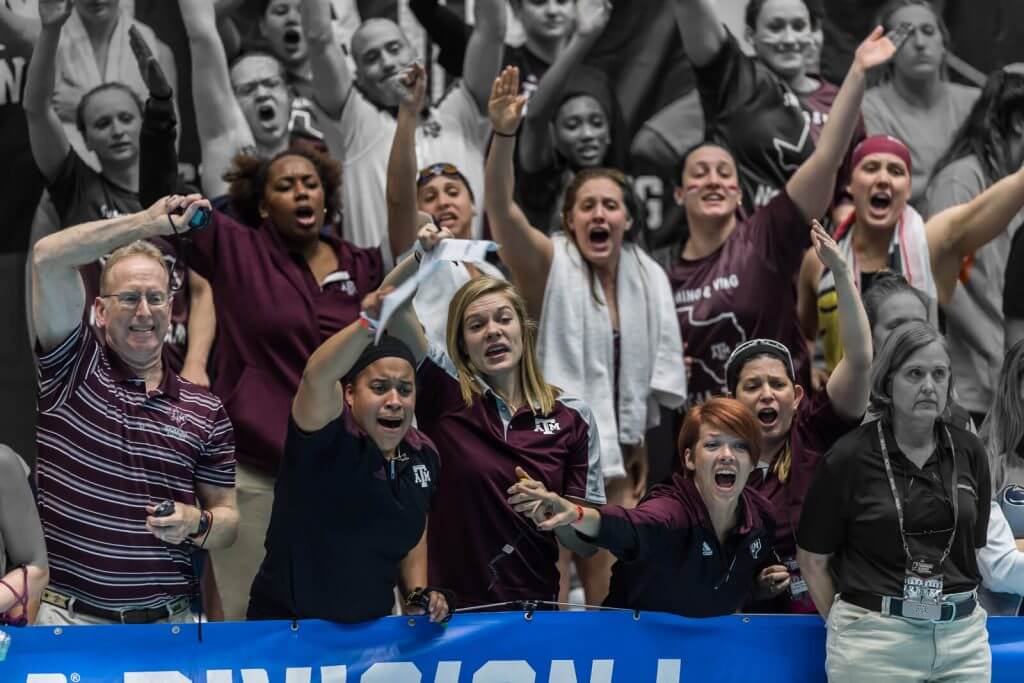Morning Splash: Texas A&M Women Achieve Team History in Indy

NCAA DI editorial coverage is proudly sponsored by Adidas. Visit adidasswimming.com for more information on our sponsor. For all the latest coverage, check out our event coverage page.
 CLICK FOR FULL RESULTS
CLICK FOR FULL RESULTS
By David Rieder.
Over the course of the four-day women’s NCAA championships, Stanford broke seven American records and won ten events on the way to a 160.5-point victory in the team race.
Finishing in a solid second were the California Golden Bears, who saw Kathleen Baker turn in a swimmer-of-the-meet worthy performance with three individual victories, including the second-fastest times in history in both the 200 IM and 100 back.
Coming into the meet, it would have taken some dramatic development—like huge time drops or multiple DQs—for any team to challenge the Cardinal for the top spot in the team race or make a run at Cal for second. But third place was another story, as the psych sheet projected five teams to finish within 40 points of each other.
But by the end of day three, one team had taken full control of that battle: Texas A&M.
Early on in the meet, a third-place finish seemed well out of reach for the Aggie women after a rough finish in the meet-opening 800 free relay. The team finished ninth in 6:58.62, almost a second short of its seed time.
“None of us were happy with our splits,” Sydney Pickrem said. “Everyone was slower than we were at SECs. For that to be the first race for A&M out of the gate, it was like, ‘Ok. We need to figure something out.’”
The next morning, everything changed.
“The person that really took a big turn was TeTe (Esther) Gonzalez,” Pickrem recalled. “It was in the morning of the 200 IM, and she went a best time two or three heats before me. And then Kristin went up and went another best time. And then I see Bethany smiling under her goggles, and then she went a best time. And I was like, ‘I’m going to go fast!’ That type of momentum, it was contagious.”
On day three, the Aggies had put four swimmers into championship finals, and Pickrem provided the highlight, finishing second in the 400 IM in 3:59.36, becoming just the ninth woman in history to break the four-minute barrier in the event.
The Aggie faithful exploded when the scoreboard showed a “3” in the minutes’ digit next to Pickrem’s name.
“Breaking a barrier like four minutes is more rewarding than just going a best time,” she said.
The team finished the night up 39 points ahead of Georgia headed into the fourth and final day of competition but still needed a strong qualifying session to lock up the third-place finish, but recent history gave head coach Steve Bultman full confidence that his team would deliver.
“At SECs, when it was a three-team battle in 2016, we stepped up and had a great last morning,” he recalled. “Last year at NCAAs, I think we were seeded lower, and then we moved up where it looked like we were going to get fifth, but we had to have a good last day, and we had a dynamite last morning, and fourth was going to happen.”
Indeed, Beryl Gastadello joined Pickrem, Galat and Gibson as top-eight finishers out of prelims, and Pickrem posted the top performance of the night with a fourth-place time of 2:05.23 in the 200 breast. After an eighth-place finish in the 400 free relay, the Aggies had finished with 292.5 points, 40 more than fourth-place Georgia. They had broken what Bultman called the “glass ceiling.”
“Five times we’ve been fourth, four times in a row,” he said. “It’s history for the team, doing something we’ve never done before. That’s neat.”
All commentaries are the opinion of the author and do not necessarily reflect the views of Swimming World Magazine nor its staff.




.jpg)

Maybe Amanda should consider swimming for them?
Congratulations
Gig’em!!!
Fake news. It was not a solid 2nd place performance by Cal, with swimmer of meet worthy performance by Baker. Try Cal lost the meet by the largest margin of any team in more than a decade (14 years)!! As for Swimmer of Meet, try Ledecky who swept titles in 200-400-1650 Free, had an individual AR, two relay ARs, 4 NCAA records and 4 NCAA Champs records as part of a team that won its first National title in 19 years. Or do we now live in a world where “second best performances ever” are better than best performances ever?